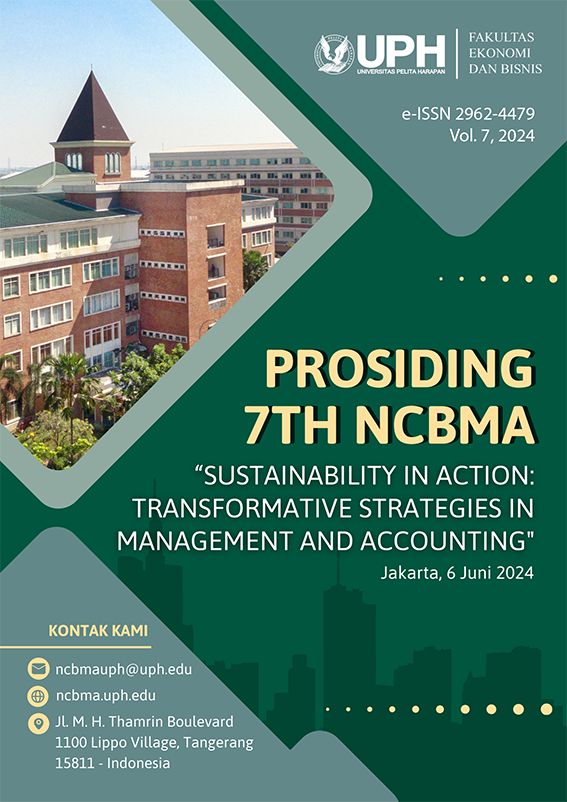PERAN KNOWLEDGE MANAGEMENT SEBAGAI PENGUNGKIT KEBERHASILAN ORGANISASI
Keywords:
Knowledge, Leadership, Management, OrganizationAbstract
Knowledge management is a procedure that assists companies in executing the processes of sorting, identification, arrangement, dissemination, and transfer of information as well as fundamental skills that constitute the competency of the company. The objective of knowledge management is to provide an understanding to all individuals regarding the managerial system. The primary resource that needs to be professionally managed is human resources, aiming to establish a more effective and efficient organizational management system. In an organization or business, each employee can experience the benefits of implementing knowledge management without having to start from scratch. Conversely, they can swiftly acquire such knowledge and enhance their individual competencies as part of leadership values development that will ultimately lead to organizational development. This article constitutes a library study and identifies that knowledge management plays a crucial role in enhancing organizational leadership capacity.
References
Amir, Amizawati Mohd., and Md. Sofiah Auzair. (2013). “Proposed Efficiency Framework for Microfinance Institutions in ASEAN.” Pp. 770-80 in Proceedings of the 2nd Applied International Business Conference (AIBC2013).
Bass, Bernard M. (1985). “LEADERSHIP AND PERFORMANCE BEYOND EXPECTATIONS.” Academia.Edu.
Bass, Bernard M. (2000). “The Future of Leadership in Learning Organizations.” Journal of Leadership & Organizational Studies (Volume 7, Issue 3).
Benardi, M. Chaidir, and Setyowati. (2021). “Pengaruh Mata Pelajaran Kewirausahaan Dan Lingkungan Pergaulan Terhadap Motivasi Berwirausaha Siswa SMKS Al - Hamidiyah.” Edukatif : Jurnal Ilmu Pendidikan 3(6):4881-4888.
Darudiato, Suparto, and Kevin Setiawan. (2013). “Knowledge Management: Konsep Dan Metodologi.” Jurnal ULTIMA InfoSys 4(1).
Harahap, Sahala, Diajeng Herika Hermanu, and Tanti Sugiharti. (2022). “Lombok Teachers and Principals Building Resilience in Facing Earthquakes and COVID-19 Pandemic.” Education Quarterly Reviews 5(2).
Patricia, Mia Christy. (2023). “SUSTAINABLE RETAIL FINANCING IN TURBULENT AND DIFFICULT MARKET CONDITIONS : A DYNAMIC CAPABILITY PERSPECTIVE.” Journal of Management and Entrepreneurship Research 4(1).
Pingkan, Jeniver Aprili, and A. Sigit Pramono Hadi. (2021). “Pengaruh Komunikasi Internal Perusahaan Terhadap Motivasi Kerja Karyawan.” Prosiding Hubungan Masyarakat 7(1).
Primawanti, Eka Putri, and Hapzi Ali. (2022). “Pengaruh Teknologi Informasi, Sistem Informasi Berbasis Web Dan Knowledge Management Terhadap Kinerja Karyawan (Literature Review Executive Support Sistem (Ess) for Business).” Jurnal Ekonomi Manajemen Sistem Informasi, 3(3), 267-285. 3(3).
Soepardy, Ahmad Taufiq. (2020). “Pengaruh Knowledge Management Terhadap Sustainable Livelihood.” Jurnal Ilmiah Akuntansi Manajemen, 3(1).
Sugiharti, Tanti. (2023). “Sustainable Leadership Best Practices in Enhancing Business Resilience and Performance of Robusta Coffee Farmers. Journal of Enterprise and Development.” Journal of Enterprise and Development (JED), 5(Special-Issue-2) 5(Special issue):387-401.
Tulungen, Evans E. W., David P. E. Saerang, and Joubert B. Maramis. (2022). “Transformasi Digital : Peran Kepemimpinan Digital.” Jurnal EMBA : Jurnal Riset Ekonomi, Manajemen, Bisnis Dan Akuntansi 10(2).
Wajong, Boy Eduard Richard, Dadang Irawan, and Wylen. (2020). “Persepsi Karyawan Pada CSR, Keterlibatan Karyawan, Dan Kepemimpinan Etis Pengaruhnya Terhadap Kreatifitas Karyawan.” JURNAL ADMINISTRASI BISNIS (JAB), 10(2) 10(2):72-29.
Widyatmika, Made Adi, Tjokorda Putra, and Made Novia Indriani. (2019). “Knowledge Management Dalam Organisasi.” Widya Teknik, 13(02) 13(2).
Yulianti, Grace, M. Chaidir, and Ngadi Permana. (2022). “The Influence of Entrepreneurship Education and Industrial Work Practices on Interest in Entrepreneurship in State Vocational High School Students in the Central Jakarta Region.” Jurnal Administrare: Jurnal Pemikiran Ilmiah Dan Pendidikan Administrasi Perkantoran 9(2).
Zed, Mestika. (2008). Metode Penelitian Kepustakaan. Yayasan Pustaka Obor Indonesia.
Downloads
Published
Issue
Section
License
Copyright (c) 2024 A Sigit Pramono Hadi, Aretha Widi Ailani

This work is licensed under a Creative Commons Attribution-ShareAlike 4.0 International License.

